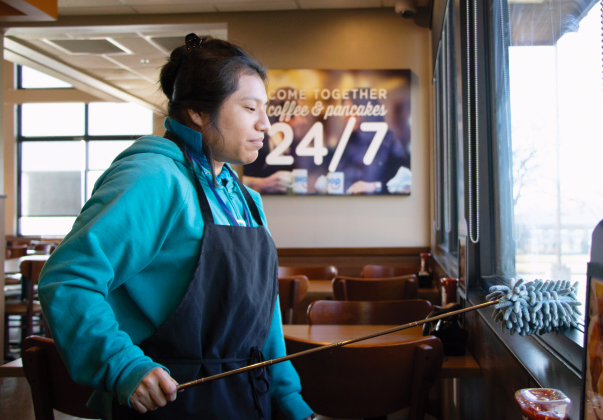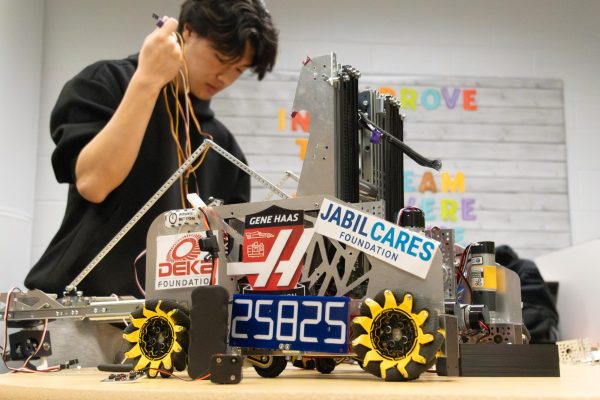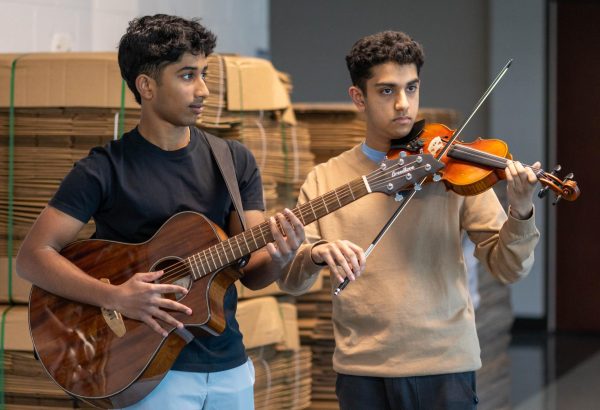Steps to success
The Career Development Opportunities Program brings life skills and experience to those involved.
Sarah Bell works at IHOP where she helps clean and busses tables. “I like bussing tables,” Bell said.
Every morning, junior Sarah Bell hops on the school bus and heads to her job at IHOP. At IHOP, she clears dishes and wipes down tables as a busser.
“I like bussing tables. That means [taking] the dishes back,” Sarah said. “I just do not like wiping down tables.”
Sarah is a member of the Career Development Opportunities Program (CDOP) which is an elective credit program offered in the Blue Valley School District. It is designed to help students develop job skills. The program is focused toward students who have an Individual Education Program (IEP) due to low incidence disabilities or moderate intellectual disabilities.
The program is integrated into a student’s schedule as two courses, either third and fourth or sixth and seventh hour, allowing them to attend their job for about an hour every day. A bus is provided to take students to and from their job.
Avery Reid, BVNW 2022 alum, was part of the program for her junior and senior year. She said she worked a morning shift at various places including Cosentino’s, Panera and Crumbl Cookies.
“I would take the bus to my job and the bus would take me back to the school. There was morning and afternoon and I was in the morning and I would come back in the afternoon,” Reid said. “[Our job coach] would come and see how everyone was doing.”
BVNW and BVN Transition Specialist Kotoka Kerr is responsible for helping students, specifically those with IEPs, transition after high school. In regards to the CDOP, Kerr determines the best fit employment for students and works with companies to create those opportunities.
“The first step in the process is trying to figure out what a student’s interests [are], what they are interested in doing after high school,” Kerr said. “A lot of times we try to connect them with an employment experience in our community that’s connected to their area of interest.”
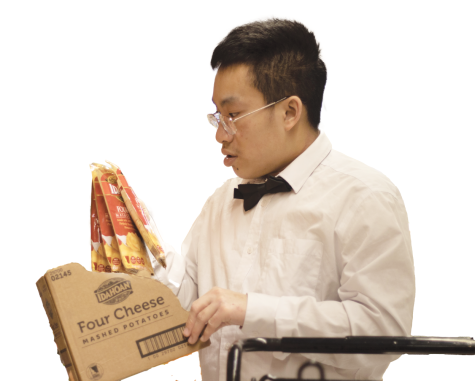
Cyndi Reid, mother of Avery Reid, said this was true.
“[Avery] would usually be able to give her opinion on what type of job she would like,” Cyndi said.
When reflecting on her time in the CDOP, Avery said she is glad she did not work at the same place both years.
“I think it was best to [go to] different places so I [could] see what the difference was in different jobs,” Avery said.
Cyndi also said she believed working at multiple places was beneficial to decide places Avery could thrive in the future.
“It helped us determine that [Avery] needed to be in a workplace environment that was a social setting for her to enjoy it,” Cyndi said.
While Avery prefers a social workplace, senior Jaden Hill said a quieter setting is best for her. Jaden currently works at the Blue Valley Public Library, previously being employed at Pawsibilities, a company that makes dog toys.
Similar to Cyndi, Cori Hill, Jaden’s mom, said that working at multiple places has helped Jaden determine where she works best.
“She likes it because it’s a quiet place with not a lot of noise and distractions,” Cori said.
Jaden mentioned she likes working at the library because it is quiet and has helped her prepare for future jobs.
“It gives me more time to focus,” Jaden said.
While some students go through the CDOP only to find what they believed they wanted to do was not the right match for them, Kerr said some students find a good match and acquire jobs through their employment in the CDOP.
“One of the students we have is working at an auto mechanic shop,” Kerr said. “When he graduates from high school, they would like for him to come and work with them full time while he goes to college to work on his auto mechanic certificate.”
After working at Panera, Avery was hired part time over the summer. Cyndi said that while she struggled with the cash register and money side of the job, Avery appreciated the social side of the job.
“She enjoyed [working at Panera] because she worked in a bakery and was able to talk to people that came in and enjoy the other employees and the manager she had,” Cyndi said.
Northwest’s Intensive Resource Special Education teacher Kassidy Evans has worked with the CDOP for two years. While the program is focused on building job skills, she said it is also beneficial to her students by giving them experiences and exposure in the community.
Evans said there are multiple skills students involved in the program develop and improve. These include communication, time management and organization. She also said students become more independent through the program.
“I mean, [it’s] even as simple as the independence of washing their uniform and managing their uniform, to know when they need to leave class to go change into their uniform,” Evans said.
When observing Avery’s experience with the CDOP her senior year, Evans said Avery’s autonomy grew a large amount.
“Avery grew incredibly independent in the CDOP program,” Evans said. “I think her confidence grew, as well as just being able to independently navigate the whole routine of going to work every day.”
Likewise, Cyndi said that Avery’s confidence and independence levels grew through the program.
“Initially she did rely on a job coach quite a bit, but in the program she definitely was more independent and she was able to communicate with the driver that picked her up,” Cyndi said. “[She] felt more comfortable in a job setting.”
Most students in the CDOP have a job coach who goes to work with them. Evans was a job coach for one of her students when she was a para, prior to being the Intensive Resource Special Education teacher.
“A job coach is almost like the equivalent of a paraprofessional, but instead of working within the classroom, they’re going into the community with workers,” Evans said. “They’re working on job training skills and just developing the skills that are relevant for that student’s job.”
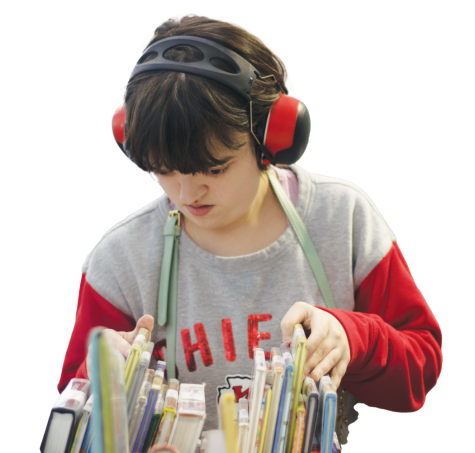
Job Coach Roshonda Musau is currently Sarah’s job coach, along with two other students in the district. In regards to Sarah, Musau said her strength is she knows how to do her job well.
“She knows what she needs to do, she has learned how to do everything,” Musau said. “She is pretty independent.”
Jennifer Bell, Sarah’s mother, said she has noticed an increase in confidence in Sarah throughout her first year in the program.
“She’s actually become a little more helpful at home in wanting to do things like help clear the table and stuff,” Jennifer said. “It’s definitely teaching her [the] skills she needs.”
Cori said she experienced similar skill developments in Jaden as Jennifer did with Sarah.
“Her communication skills are really good for the level that she is and she’s learned a lot from the program and a lot of life skills,” Cori said. “It’s been a great opportunity for her. Even things that we don’t even think about on a day-to-day basis.”
Post high school, Jaden plans to attend college at Johnson County Community College and join the 18-21 program. It is offered to students with IEPs who need extended time after high school to prepare for life.
Avery is currently a part of this program. She said the 18-21 program is very similar to the CDOP. She said she feels they both focus on building job skills along with other life skills, like being able to talk to people.
“It’s easy for me because all you do is clean, and once I know where everything is it’s easy for me to do,” Avery said.
According to Cyndi, students who are a part of the 18-21 program spend half of their day at a job and the other half focusing on building life skills. Avery is in her second semester of this program, meaning she has worked at two different places, the preschool side of Hilltop and now TJ Maxx, and has liked them both.
“My hope [is that], by the end of the program, she will have tried [jobs in] different areas to see what she might want to do when she gets a real job,” Cyndi said.
In regard to deciding what programs to take part in, Cyndi said it is important to focus on what a child thrives in and needs to work on.
“I would say just really look at the strengths of your particular child and make sure that the program is a good fit for where you see them thriving,” Cyndi said.
Cori believes the CDOP can find a job for almost anyone and would recommend the program to others. She also said it is a great way to get involved.
“I think [it is] a great opportunity. They can be a part of the community and work just like everyone else does,” Cori said. “They might not be able to work at a full time level, but it gives them something to do just like we do every day.”
Musau agrees that the CDOP is a good opportunity for students with special needs, and believes that parents should give them the opportunity to be part of it.
“I think if they want their children to be a part of society and perhaps advocate for themselves, it would be a good idea for them to gain independence,” Musau said.
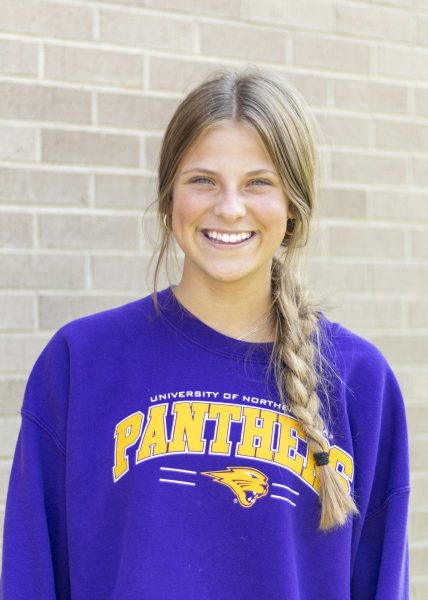
Addie Aadland is a junior and writer for “The Express.” This is her second year on staff. Outside of newspaper, Aadland is involved in Quill and Scroll, Team Up for St. Jude, and girl’s basketball. Outside of school, she enjoys hanging out with her friends and family and going on vacation. Aadland also loves working with kids and babysitting. She is hoping to improve the newspaper as the year goes on. Aadland is excited to be a part of the newspaper staff this year at Northwest.
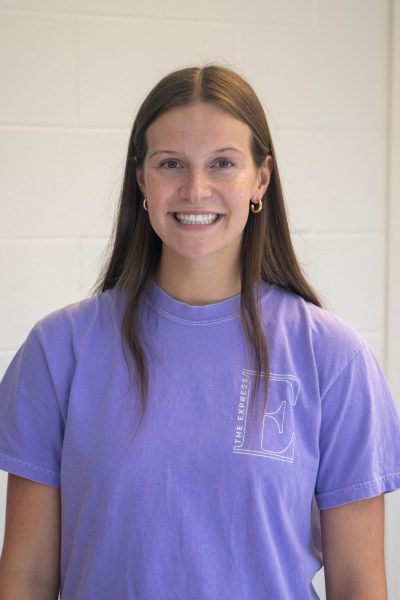
Sydney Barnett is a senior at Northwest and one of this year’s Editors-in-Chief for The Express. This is her third year on staff, having previously been a writer and the Chief Writer. At school, Sydney is involved in girls soccer, BVNW Ambassadors, NHS, Mu Alpha Theta, Spanish NHS, Quill and Scroll, KAY club and Team Up for St. Jude. Outside of school, she enjoys club soccer, hanging out with friends, spending time outside and listening to music. She also likes volunteering and working with children. Sydney is super excited for her last year on staff and cannot wait to see all the staff accomplishes!
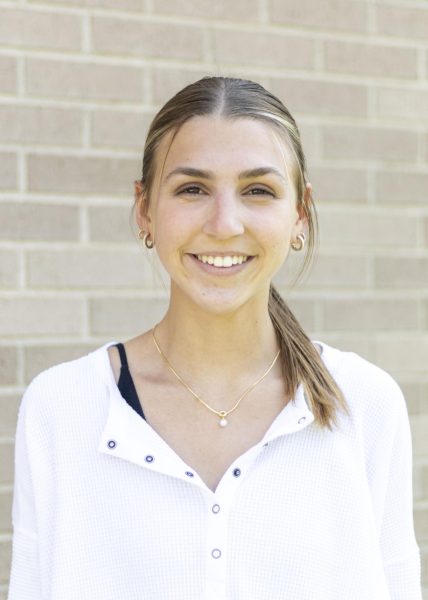
Lila Vancrum is a senior and Editor-In-Chief for “The Express.” This is her third year on staff, previously serving as a photographer and photo editor. Outside of newspaper, Lila is involved in girl’s soccer, KAY Club, Team Up for St. Jude’s, NHS and Quill & Scroll. In her free time she enjoys going out to eat, hanging out with friends and binging TV shows, her favorites include “One Tree Hill” and “Pretty Little Liars.” Lila is excited to take on the role of being an Editor-In-Chief and hopes to improve the photography for stories and social media.


